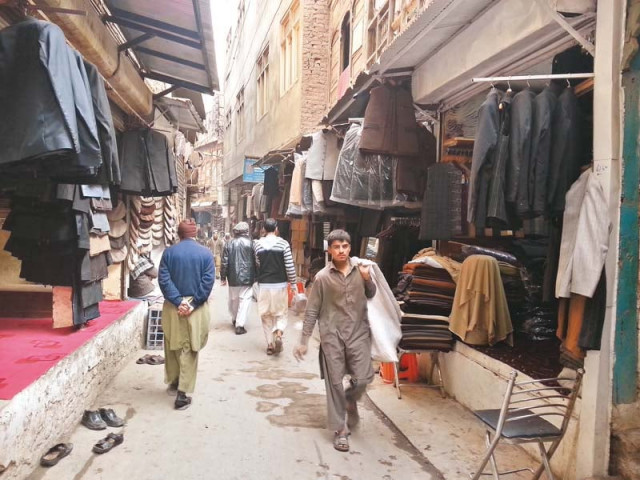Chitrali Bazaar: The bustle of yore
Traders and customers remember the time when Chitrali Bazaar was a favourite among foreign and local customers

ONCE A CROWDED MARKET, THE NUMBER OF CUSTOMERS HAS DECLINED CONSIDERABLY AT CHITRALI BAZAAR. PHOTOS : ABDUR RAZZAQ

Sadiq Ameen, the president of Anjuman-e-Tajran Chitrali Bazaar, says the bazaar was famous for the quality of its goods. “Before the September attacks, visitors from across the globe used to come to buy woollen products. Afghanistan was one of the biggest markets for our products, but then both foreigners and Afghan traders stopped buying,” he adds. The pakol and waistcoat are favourite souvenirs for people from other provinces of Pakistan. However, the little business generated from local customers was not enough to keep businesses afloat. “Most skilled men have left the business and moved to Karachi, Rawalpindi or Middle Eastern countries to earn a livelihood,” says Ameen, who has been associated with the business for 55 years. According to him, the number of labourers per shop went down from five to six, a decade ago, to just two. During recent years, overall business activity at the market has reduced by over 65%, he claims.

A shopkeeper gives final touches to a pakol. PHOTOS : ABDUR RAZZAQ
Chitrali Bazaar was established by shopkeepers from Upper Chitral in the late 1940s. It is believed that before Partition, there was a bazaar-e-husn (market for beauty) at the site of Chitrali Bazaar. This was where locals, as well as the British elite, came to enjoy performances by dancers and musicians. Later though, some locals and clerics started a movement to shut down the bazaar and eventually succeeded. After the closure of bazaar-e-husn, local elders built four small mosques at each corner and expressed the desire to rename the market ‘Islamabad’ — a name government documents still bear.
Decades later, a lot has changed. While the Chitrali patti (pure woollen fabric known as ‘Shu’ in Khowar language) is still brought from Chitral and traditional items like waistcoats and pakol are made by tailors at the bazaar, the poor security situation in the region has discouraged businessmen. Businessman Haji Fazal Khan, also a resident of Chitral, says that though business has been affected by the deteriorating law and order situation in Fata and parts of K-P, the tragic attack on the Army Public School in Peshawar last December brought commerce to a standstill. “After the attack, businessmen were unable to even pay their shop’s rent. Afghans are our prime customers and thousands of them left Pakistan after the incident,” laments Khan.
The ongoing militancy and resultant military operations has been another deathblow to business. “Due to the Zarb-e-Azb operation in North Waziristan, I haven’t been able to recover Rs1.6 million from sales because there is no news of the people who purchased the goods from me,” says Khan. According to him, tribesmen from Waziristan can’t move around freely in Peshawar as police and security agencies often question or harass them. Khan claims doing business with Afghans is not very profitable any longer as Afghan businessmen usually purchase goods on credit and “take an eternity” to pay back the money. Local businessmen cannot go to Afghanistan themselves because policemen and locals there are often not very hospitable to their Eastern neighbours, he says.

Handmade woolen products on display. PHOTOS : ABDUR RAZZAQ
Khan has been in the trade for the last 40 years and hence, knows a thing or two about the merchandise on sale in the bazaar. He says good quality cloth is usually handmade by Chitrali women during winters when the valley is draped in snow and there is little else to do. The price of a handmade Chugha is around Rs15,000 to Rs20,000, while those machine-made from Lahori cloth are much cheaper to procure. People prefer the garb available at Chitrali Bazaar over other places because the handmade fabric is very light but durable at the same time, explains Khan.

A shopkeeper waits for customers. PHOTOS : ABDUR RAZZAQ
Khan Ali, who lives near Dalazak Road in Peshawar, saunters through the bazaar looking to buy a waistcoat and Chitrali cap. He maintains that the quality of handmade Chitrali patti items available here is the best in the city. “The things I have bought from here are very economical and the attitude of businessmen is also pleasant. Elders from my family have been coming here to purchase goods for the last 15 years,” he adds. Ali says a major reason he prefers Chitrali patti items over Western jackets and caps is the durability of the former. But for him, it is also about preserving cultural identity. “It makes me proud,” he says with a smile.
Abdur Razzaq is a Peshawar-based radio and print journalist. He tweets @TheAbdurRazzaq
Published in The Express Tribune, Sunday Magazine, July 5th, 2015.


















COMMENTS
Comments are moderated and generally will be posted if they are on-topic and not abusive.
For more information, please see our Comments FAQ